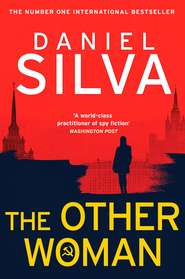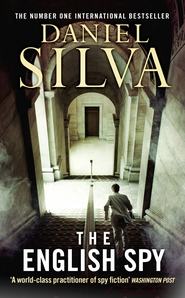По всем вопросам обращайтесь на: info@litportal.ru
(©) 2003-2024.
✖
The Heist
Настройки чтения
Размер шрифта
Высота строк
Поля
She rolled her eyes and sipped from her plastic water bottle.
“Did I say something wrong?”
“You don’t have to ask me how I’m feeling all the time.”
“I want you to know that I’m concerned about you.”
“I know you’re concerned, darling. But I’m not terminally ill. I’m just pregnant.”
“What should I ask you?”
“You should ask me what I want for dinner.”
“I’m famished,” he said.
“I’m always famished.”
“Should we go out?”
“Actually, I feel like cooking.”
“Are you up to it?”
“Gabriel!”
She began to needlessly straighten the papers on her desk. It wasn’t a good sign. Chiara always straightened things when she was annoyed.
“How was your work?” she asked.
“It was a thrill a minute.”
“Don’t tell me you’re bored with the Veronese.”
“Removing dirty varnish isn’t the most rewarding part of a restoration.”
“No surprises?”
“With the painting?”
“In general,” she answered.
It was a peculiar question. “Adrianna Zinetti came to work dressed as Groucho Marx,” Gabriel replied, “but otherwise it was a normal day at the Church of San Sebastiano.”
Chiara frowned at him. Then she opened a drawer with the toe of her boot and absently inserted a few papers into a manila folder. Gabriel wouldn’t have been surprised if the papers bore no relation to the others already in the file.
“Is there something bothering you?” he asked.
“You’re not going to ask me how I’m feeling again, are you?”
“I wouldn’t dream of it.”
She closed the drawer with more force than necessary. “I stopped by the church at lunchtime to surprise you,” she said after a moment, “but you weren’t there. Francesco said you had a visitor. He claimed not to know who it was.”
“And you knew Francesco was lying, of course.”
“It didn’t take a trained intelligence officer to see that.”
“Go on,” said Gabriel.
“I called the Operations Desk to see whether anyone from King Saul Boulevard was in town, but the Operations Desk told me that no one was looking for you.”
“For a change.”
“Who came to see you today, Gabriel?”
“This is beginning to sound like an interrogation.”
“Who was it?” she asked again.
Gabriel held up his right hand and then lowered two of the fingers.
“General Ferrari?”
Gabriel nodded. Chiara stared at her desk as if searching for something out of place.
“How are you feeling?” asked Gabriel quietly.
“I’m fine,” she replied without looking up. “But if you ask me that question one more time …”
It was true that Gabriel and Chiara did not actually live in the ancient ghetto of Venice. Their rented apartment was on the second floor of a faded old palazzo, in a quiet quarter of Cannaregio where Jews never had been forbidden to enter. On one side was a quiet square; on the other was a canal where King Saul Boulevard kept a small, fast boat, lest Gabriel had need to flee Venice for the second time in his storied career. Tel Aviv had good reason to be mindful of his security; after many years of resistance, he had agreed to become the next chief of the Office. A year remained until his term was to begin. After that, his every waking moment would be devoted to protecting the State of Israel from those who wished to destroy it. There would be no more restorations or extended stays in Venice with his beautiful young wife—at least, not without an army of bodyguards watching over them.
The apartment had been fitted with a sophisticated security system, which chirped benignly when Gabriel pushed open the door. Entering, he removed the cork from a bottle of Bardolino and sat at the kitchen counter, listening to the news on the BBC, while Chiara prepared a platter of bruschetta. A UN panel had predicted an apocalyptic warming of the global climate, a car bomb had killed forty in a Shiite neighborhood of Baghdad, and the Syrian president, the butcher of Damascus, had once again used chemical weapons against his own people. Chiara frowned and switched off the radio. Then she looked longingly at the open bottle of wine. Gabriel was sorry for her. Chiara had always loved to drink Bardolino in the springtime.
“It won’t harm them if you take just a sip,” he said.
“My mother never touched wine when she was pregnant with me.”
“And look how you turned out.”
“Perfect in every way.”
She smiled and then placed the bruschetta in front of Gabriel. He selected two slices—one with chopped olives, the other with white beans and rosemary—and poured some of the Bardolino. Chiara peeled the skin from an onion and with a few quick thrusts of her knife turned it into a pile of perfect white cubes.
“You’d better be careful,” said Gabriel, watching her, “or you’ll end up looking like the general.”
“Don’t give me any ideas.”
“What was I supposed to say to him, Chiara?”











